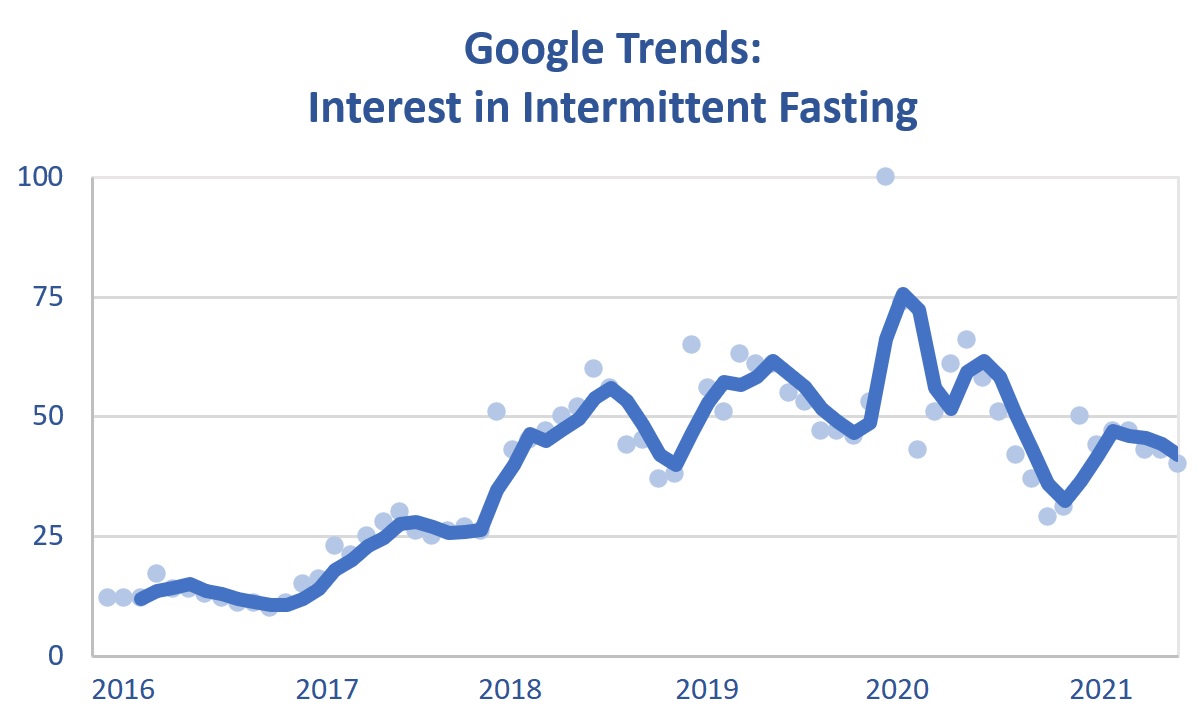
Intermittent Fasting: An RCT Says ‘Meh’
 Two years ago, intermittent fasting was a hot concept. The idea was that periods of fasting could have metabolic benefits and help with weight loss – better than simply restricting calories. Popular interest peaked in early 2020 and has since been declining. Now, a new RCT of intermittent fasting – small, but well controlled – says it’s nothing special.
Two years ago, intermittent fasting was a hot concept. The idea was that periods of fasting could have metabolic benefits and help with weight loss – better than simply restricting calories. Popular interest peaked in early 2020 and has since been declining. Now, a new RCT of intermittent fasting – small, but well controlled – says it’s nothing special.
In fact, in this study, alternate day fasting caused less fat loss than simple daily calorie restriction.
A Three-Way Comparison
This study had three arms, with 12 subjects in each group. These were lean, healthy individuals. One group restricted their energy consumption by 25 percent without fasting. Another fasted on alternate days without reducing their overall energy consumption. The third fasted on alternate days and reduced their overall energy consumption by 25 percent.
Continuous calorie restriction led to more reduction in fat mass than either of the fasting regimens. Researchers also looked for differences in indicators of heart and metabolic health. They found none. James Betts, senior author of this study, offered a perspective:
“Many people believe that diets based on fasting are especially effective for weight loss or that these diets have particular metabolic health benefits even if you don’t lose weight. But intermittent fasting is no magic bullet. The findings of our experiment suggest there is nothing special about fasting when compared with more traditional, standard diets people might follow.”
Maintaining Muscle Mass
The intermittent fasting group with calorie restriction did lose some, but not quite as much weight as the simple calorie restriction group. But the fasting group lost as much muscle mass as fat mass. This is not a good signal, says Betts:
“Most significantly, if you are following a fasting diet it is worth thinking about whether prolonged fasting periods are actually making it harder to maintain muscle mass and physical activity levels, which are known to be very important factors for long-term health.”
More Research Needed
Stepping back from this particular study, it’s important to note that intermittent fasting comes in many different forms. This was a small study of alternate day fasting with lean, healthy subjects. In no way does it prove that alternate day fasting has no benefits. But it does suggest that we need more research to understand what approaches, in what circumstances, have real clinical benefits.
Writing in the Archives of Endocrinology and Metabolism, Bruno Halpern and Thiago Bosco Mendes say that intermittent fasting can be a safe alternative to daily calorie restriction for weight loss. But they go on to say:
“Its effects on weight are directly related to caloric restriction and not the metabolic effects of fasting. More work is needed to establish if prolonged fasting can have a weight-independent impact on insulin sensitivity and other metabolic and oxidative markers in humans, as shown in animals.”
Perhaps it’s a good thing that the faddish interest in intermittent fasting is fading.
Click here for the RCT and here for further perspective on it. For the review article by Halpern and Mendes, click here.
Bored, photograph © Joao Clerigo / flickr
Subscribe by email to follow the accumulating evidence and observations that shape our view of health, obesity, and policy.
July 29, 2021

July 29, 2021 at 9:09 am, John DiTraglia said:
3 more items:
-Intermittent fasting may have been a fact of life for much of our history.
-There might be a benefit to longevity of autophagy which is intermittent fasting’s claim to fame.
-It might be easier to suffer every other day than be miserable all the time forever. But if you do lose weight then you’re gonna be hungry, so maybe not.
July 29, 2021 at 11:34 am, Brian Edwards said:
My interest with IM is lower glucose and ketosis.
July 29, 2021 at 2:44 pm, Ted said:
In this study, Brian, intermittent fasting did not have a differential effect on “fasted concentrations or postprandial responses of plasma glucose.” This was a primary outcome target for the research.
August 06, 2021 at 1:22 pm, Stewart Lonky, MD said:
That’s one view. However, there are others perspectives.
https://doi.org/10.1038/nrm3308